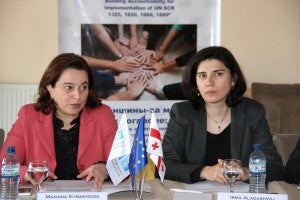The Interagency Working Group presents the recommendations on the establishment of a National Referral Mechanism for the prevention and protection of survivors and victims of Sexual and Gender-Based Violence
Date:
UN Women/EU cross-regional programme ‘Women Connect Across Conflicts: Building Accountability for Implementation of UN SCR 1325, 1820, 1888, 1889’” facilitated today the meeting to present the recommendations developed by the interagency Working Group for the establishment of a suitable National Referral Mechanisms for Victims of gender-based violence, including sexual violence (SGBV) to the new Gender Equality Council.
In April 2012, under the aegis of the Gender Equality Council of the Parliament (GEC) and technical support from the UN Women/Cross-regional Programme an ad hoc inter-agency working group on NRMs was established. The working group comprises members from the Gender, Equality Council, key Ministries and NGOs sector.
With UN Women technical support a workshop was conducted during which the working group members developed a set of draft recommendations for a model to be established in Georgia. Today’s meeting served to present the concluding work of this Working Group tasked to identify the most suitable referral system for the country.
"I want to tell special thanks to the UN Women and all UN agencies working in Georgia for their great support to the government and especially thank the working group consisting of NGOs who has done tremendous job to present this set of recommendations. All women regardless of any social status, age, race or ethnicity should be free from any kind of violence. Unfortunately, we still have not put the end to this phenomenon, but with our joint efforts, I believe we can fight it. If it was not for the active participation of the NGO sector, the Gender Equality Council would not be so successful in advocacy and policy shaping. Thanks for your efforts" said Manana Kobakhidze, Deputy Speaker of the Parliament of Georgia, and Chair of Gender Equality Council.
”The working group revised existing structures and referral mechanisms in order to contextualize the identification, protection and assistance as well as rehabilitative and other multiple services and care for survivors of GBV in conflict-times. These recommendations, if endorsed, will finally render justice to these victims/survivors and will greatly contribute to the implementation of the UN Security Council Resolutions # 1325, 1820, 1888, 1889 and 1960 on “Women, Peace and Security” in Georgia” said Graziella Piga, Programme Manager, Cross-regional Programme, UN Women.
The meeting was opened by the Deputy Speaker of the Parliament of Georgia, Chair of Gender Equality Council, Ms. Manana Kobakhidze and UN Women Cross-regional Programme Manager, Ms. Graziella Piga.
The meeting was attended by the representatives of the Parliament, Government and civil society; UNFPA, UNHCR, UN Women.
About UN Women/EU cross-regional programme ‘Women Connect Across Conflicts: Building Accountability for Implementation of UN SCR 1325, 1820, 1888, 1889’”
Starting from October 2010, UN Women with the support of the European Union has been implementing a Cross-regional programme “Women Connect Across Conflicts: Building Accountability for Implementation of UN SCR 1325, 1820, 1888, 1889” that aims to enhance the capacity of Women’s human rights activists and gender equality advocates and their networks to effectively and meaningfully engage, influence, and mobilize for dialogues on security and peace issues at various levels nationally and regionally in South Asia (Pakistan and Afghanistan), Southern Caucasus (Georgia, Armenia, Azerbaijan) and Central Asia / the Fergana Valley (Tajikistan, Uzbekistan and Kyrgyzstan).
The Programme focuses on four key areas:
• Facilitate the development and adoption of the National Action Plan (NAP) on 1325, 1820, 1888 and 1889 in Georgia and Pakistan for further replication in other target countries.
• Strengthening referral mechanisms that provide redress for sexual and other forms of violence against women in situations of conflict in Georgia.
• Incorporation of gender equality principles into the internal operations of the security sector to promote zero tolerance to using sexual violence as a weapon of war in Georgia.
• Mobilizing national partners at local level to engage in evidence-based dialogues and advocacy for reconciliation, tolerance building and compliance with women’s human rights obligations in the Fergana Valley (Kyrgyzstan, Uzbekistan, and Tajikistan).
The UN Women programme is committed to support the Government of Georgia to improve its referral mechanisms for victims of gender-based violence, including sexual violence.
